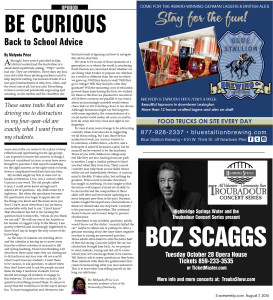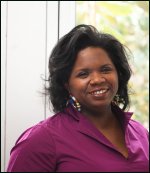Although I have seen it parodied in film, I did not understand the frustration of a small child repetitively asking, “Why?” until I had one. They are relentless. These days my four year old is like those pitching machines used to help improve batting, but instead of balls, it is a fast pace bombardment of why, how, when, and the worst one of all, but you said. Everything to him is novel and potentially engrossing and amazing. As his mother and his chauffeur (for some reason the car seems to be a place of deep reflection and questioning for his age group), I am expected to know the answers to things I have not considered in years or may have never thought to question. I find myself scrambling for the right answers or the right words to break down a complicated world into kid size bites.
My mother might say this is some sort of karmic retribution. I, too, was a curious child. Curious is my word. The old people called it nosy. I could never know enough and I asked a lot of questions. My child comes by it righteous. But when the questioner becomes the questioned, you begin to appreciate all the things you know and the many more you don’t. I have, more often than I am (at times), comfortable with, had to say, “I don’t know.” That discomfort has led to me turning the question back to him with, “whom do you think we can ask?” He will say one of his Aunties or his teacher or suggest a trip to the library. I am quietly relieved (and increasingly frightened) to know that I am no longer the only source of his knowledge.



As the days of summer are winding down and the calendar is forcing me to move away from the relative isolation of research to fall and spring teaching, I have been thinking a lot about how these same traits that are driving me to distraction in my four year old are exactly what I want from my students. I want them to be curious, to ask questions, to admit when they don’t know and to ask the people around them for help. I teach law students, but we should encourage all students to engage in this behavior. To hold on to the curiosity. To question everything around them. To refuse to accept that the world has to be the way it always has. To insert imagination and cleverness into the hard work of figuring out how to navigate this all too short life.
We seem to be in one of those moments of a generation or so where the world is reordering itself. Parents are concerned about whether we are doing what it takes to prepare our children for a world so different than the one in which we grew up. Will they learn to read? Will they go to college? Will they find jobs after they graduate? Will the mounting costs of education prevent them from having the lives we wished for them or the lives we planned for ourselves? All of these concerns are parallel to our worry about an increasingly unstable world whose chaos feels as if it is inching closer to our shores. Although historians might say this happens with some regularity, the connectedness of a social media world makes all crises no matter how far away feel very close and right at our fingertips.



To some it may seem strange to be advocating curiosity when everyone else is suggesting we all learn coding, but I am. Since he has understood work, my son has wanted to be a fireman, a ballet dance, a doctor, and a helicopter (I asked if he meant a pilot, but he assureD me he wanted to be the machine). Those of you with children in college may feel like they are also darting from one path to another. I urge a similar patience to kind you had when they were four. Their current curiosity may help them accrue skills whose utility are not immediately obvious. A curious mind is flexible. It takes risks, but nothing for granted. If the recent economic downturn has taught us anything, it is has taught us that the future will require a broad set of skills to be successful and the composition of those skills will alter and necessitate updating at a more frequent pace than in the past. Business leaders taught the importance of innovations. I think we should take one step back. Curiosity is the precursor to innovation. The continual desire to know and to learn helps to prevent obsolescence.
Sometimes to my youthful questions, adults would throw out the cliché, “curiosity killed the cat,” maybe to silence me or perhaps to offer a genuine warning about the some times negative reaction to raising an unwanted question. Those adults often failed to offer the latter half of that old saying. Curiosity killed the cat, but satisfaction brought him back. As we prepare to send students, young and old, off to a new school year, let’s encourage them to be curious. Tell them to ask as many questions as they have. Then celebrate with them the gratification that comes from knowing what was once unknown. This is at least what I am telling myself on the long car ride home.
Dr. Melynda Price is an associate professor of law at the University of Kentucky.
This article also appears on page 5 of the August, 2014 print issue of Ace.
Subscribe to the Ace e-dition for Lexington news, arts, culture, and entertainment, delivered to your inbox every Thursday morning.










